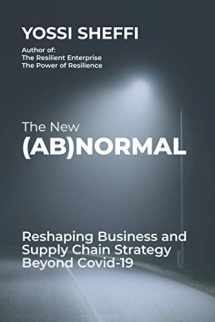
The New (Ab)Normal: Reshaping Business and Supply Chain Strategy Beyond Covid-19
Book details
Summary
Description
Much has been written about Covid-19 victims, how scientists raced to understand and treat the disease, and how governments did (or did not) protect their citizens. Less has been written about the pandemic's impact on the global economy and how companies coped as the competitive environment was upended.In his new book, "The New (Ab)Normal", MIT Professor Yossi Sheffi maps how the Covid-19 pandemic impacted business, supply chains, and society. He exposes the critical role supply chains play in helping people, governments, and companies to manage the crisis. The book draws on executive interviews, pandemic media coverage, and historical analyses. Sheffi also builds on themes from his books "The Resilient Enterprise" (2005) and "The Power of Resilience" (2015) to enrich the narrative. The author paints a compelling picture of how the Covid-19 virus is changing many facets of human life and what our post-pandemic world might look like. This must-read book helps companies to redefine their business models and adjust to a fast-evolving economic landscape.The stage is setIn Part 1 of the book, "What Happened," the author looks at how companies fought to mend the global economic fabric even as the virus ripped more holes in it. Part 2, "Living with Uncertainty," views the crisis through a supply chain risk management lens derived from Yossi Sheffi's previous books. This perspective shows how companies create corporate immune systems to quickly recognize and manage large-scale disruptions.The ongoing pandemic is creating a new normal in life, work, and education-covered in Part 3, "Adjustment Required." Consumer fears about the contagion as well as government mandates require businesses in industries such as retail, hospitality, entertainment, sports, and education to create "safe zones" for workers and customers.Many elements of the book - especially in Part 4, "Supply Chains for the Future" - show how the virus accelerated preexisting trends in technology adoption.China was the epicenter of the pandemic; it also was the first nation to be disrupted and recover. Part 5 of the book, "Of Politics and Pandemics," explains why reports that companies are abandoning China in favor of other offshore manufacturing centers do not reflect reality. Fundamentally, The New (Ab)Normal is about businesses trying to create a better future in a time of extreme uncertainty - a point emphasized in Part 6, "The Next Opportunities." The outlook is not necessarily gloomy. The advance of technology is accelerating, a trend that can level the playing field between small and large companies. Nimble small businesses are using a growing array of off-the-shelf cloud computing and mobile apps to deploy sophisticated technologies in their supply chains and customer interfaces. The New (Ab)NormalThe ongoing pandemic is creating a new normal in life, work, and education-covered in Part 3, "Adjustment Required." Consumer fears about the contagion as well as government mandates require businesses in industries such as retail, hospitality, entertainment, sports, and education to create "safe zones" for workers and customers. Another new normal is working from home. Remote working enables individuals to live anywhere and companies to recruit talent from anywhere. Education, especially higher education, faces a major disruption (and major opportunity) that is likely to shake the high-cost model of in-person education in favor of online or hybrid education. Regrettably, the book recognizes one trend accentuated by Covid-19--the growing inequality, and anticipates that the new normal will be more stratified.


We would LOVE it if you could help us and other readers by reviewing the book
Book review



